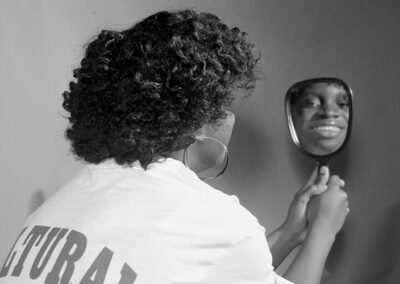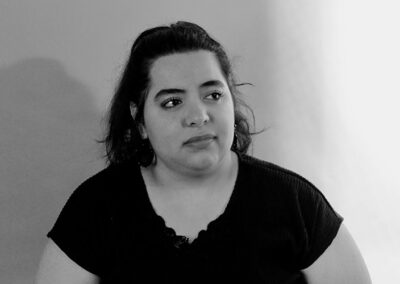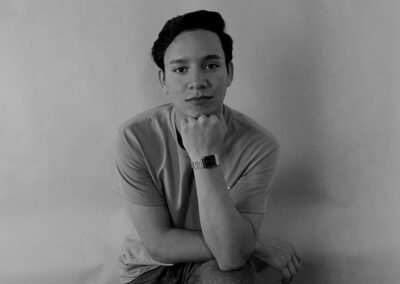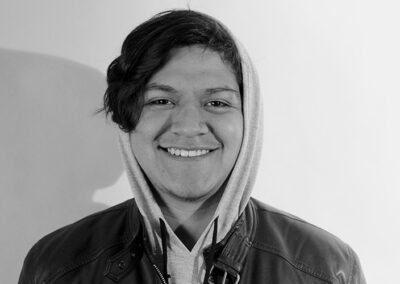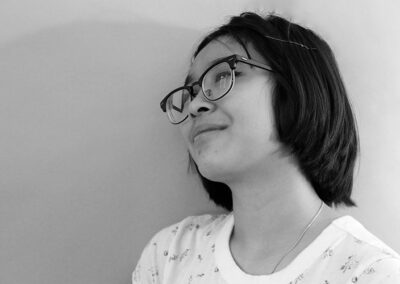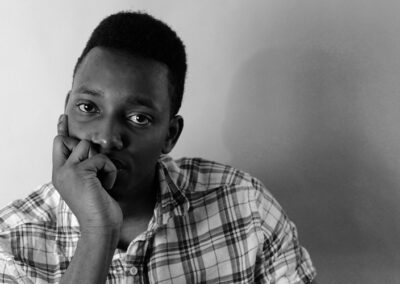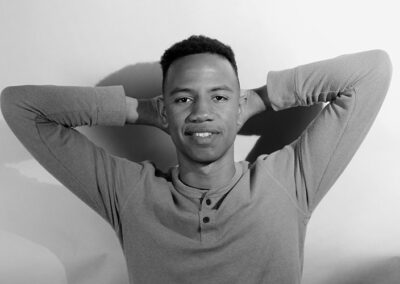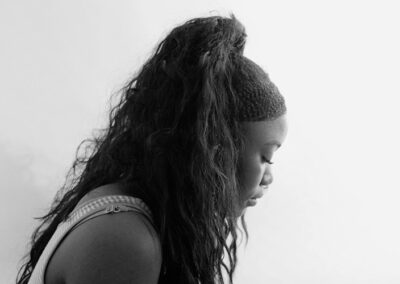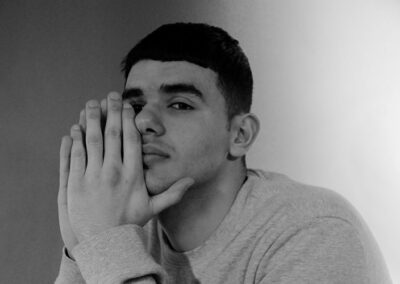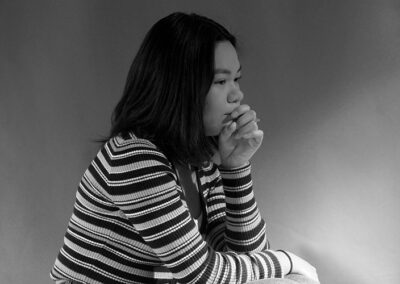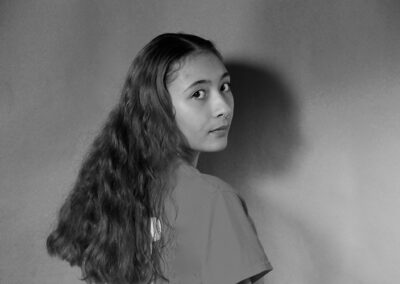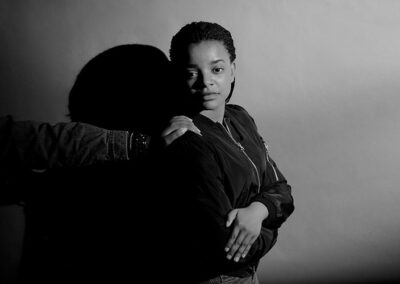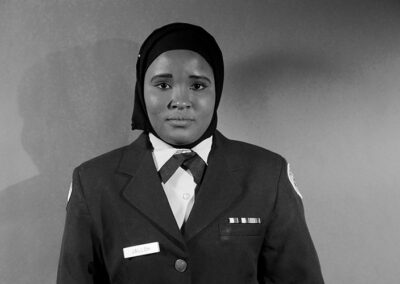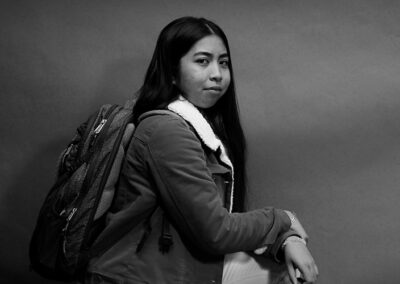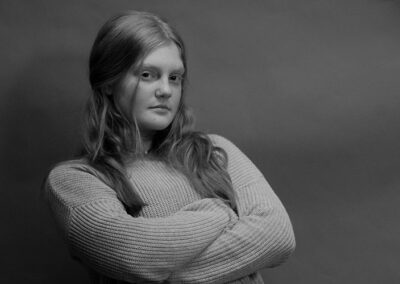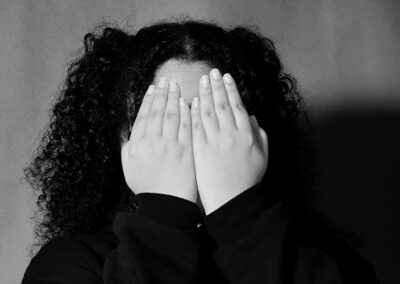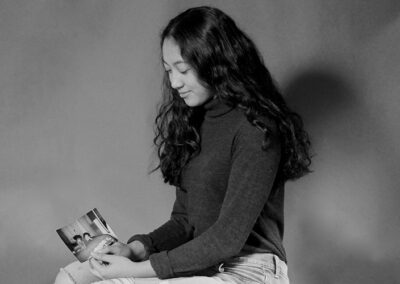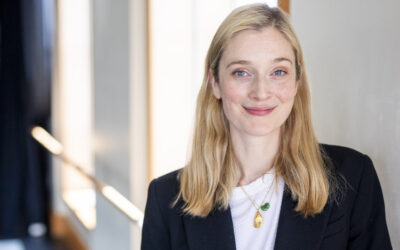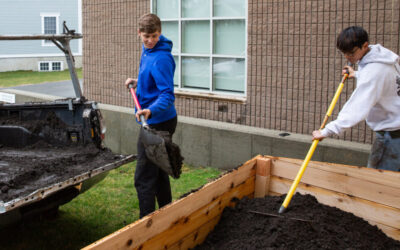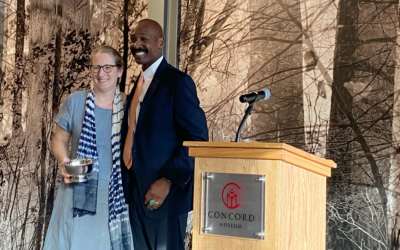Through the We Are America Project, co-founded by Jessica Lander ’06, students around the United States are making history personal
by Heidi Koelz
photos by Phyllis Bretholtz, taken for the We Are America Project
Some of the stories span a moment; others, a lifetime. The incident when a cashier mocked a Dominican-American teen’s accent. The 17 stateless years between a young woman’s birth in a Zambian refugee camp and her receipt of a U.S. green card.
Encountering racism, losing a parent, embracing an ethnic identity, understanding an autistic sibling or a family member struggling with addiction, starting an organization to get teens into science, comparing the American Dream as seen from Brazil or Colombia or Iraq or Vietnam with the reality of life in the United States — these are some of the subjects that students at Lowell High School in Massachusetts developed into person- al essays for a seminar on American diversity taught by Jessica Lander ’06. Their stories are now collected in print and as audio recordings on the website of the We Are America Project, which Lander and 18 of her former students co-founded. As more than a thousand students from secondary schools across the country add their voices, the project is sparking discussion about what it means to be American.
These Lowell High School students had their photographs taken for the We Are America Project, co-founded by their teacher Jessica Lander ’06. Their portraits speak to their individual stories of migration, family, community, belonging, loss, and gratitude.
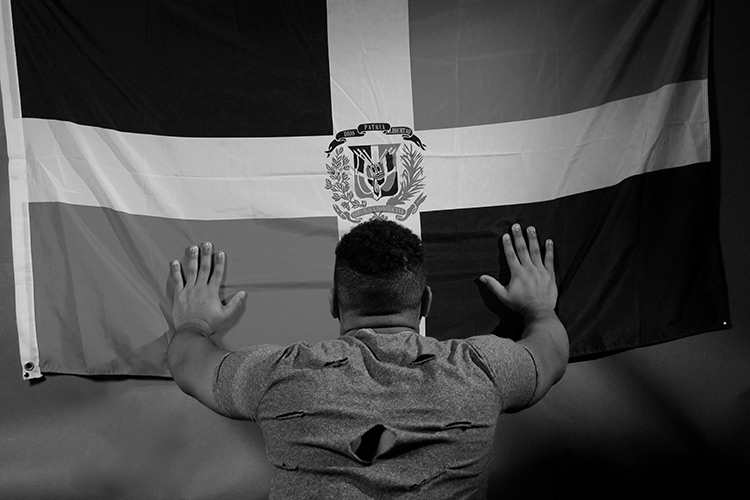
—Ezequiel Nunez, student co-founder
The first integrated public high school in the United States, open to all since its founding in the 1830s, Lowell High School is exceptionally diverse. There, Lander teaches U.S. history and civics to 11th and 12th graders from about 30 countries, most of them recent immi- grants or refugees. She co-designed the diversity seminar five years ago with a rising senior. Student-driven and collaboratively led, it focuses on the history of the American fight for equity and justice. In its first year, the class researched and wrote Defining Diversity, a book about the concepts, federal laws, and Supreme Court cases that have shaped the meaning of diversity in America, which is now used in a number of high school and community college classrooms around the country. The next year, the class created the book Achieving Equity to profile American changemakers, from Elizabeth Blackwell, the first woman in the United States to earn a medical degree, to transgender activist Jazz Jennings.
Two years ago, says Lander, “It struck me that if we’re trying to understand the history of diversity in the United States, we have to understand individual stories. Schools tend to focus on big history — wars, movements, Supreme Court cases — which is incredibly important, but at the same time, big history is made up of individual stories. I wanted my students to understand their history as important to study — not only valuable, but essential.” Lander had noticed that many of her students, both recent immigrants and those whose families had lived in the United States for generations, didn’t really feel they were American, or that others saw them as such. “I wanted them to take ownership of their identities,” she says. So in the 2018–19 school year, Lander asked her seminar students to curate a series of personal stories.
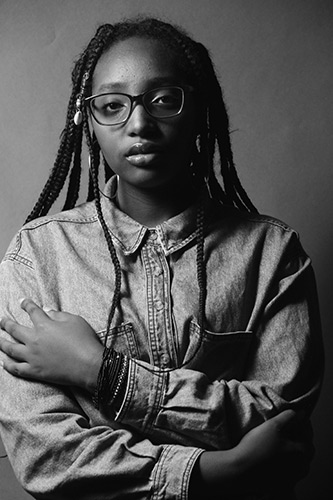
Lucie Rwakabuba, student co-founder
Her story of immigration and of experiencing discrimination is recorded in English as well as Congolese Swahili.
The students discussed, wrote, and edited, and a local photographer created striking black-and-white portraits to accompany their stories. “My students have shown such incredible perseverance, determination, humor, kindness, and generosity,” Lander says. “Their vulnerability and courage have truly been incredible.”
One of the We Are America Project student founders, Safiya Al Samarrai, who at 11 became a refugee from Iraq, says, “In this class, most of the students were immigrants. We shared the same feelings and struggles.” Her classmates included a small number of white, U.S.-born students. “I thought we wouldn’t have much in common, but I was totally wrong,” Al Samarrai says. “Ms. Lander built a relationship with each of us with trust and love. My biggest takeaway was that I’m not alone in what I have experienced.”
Nicole Harrison, another student founder, says that at first she struggled to select her topic: being raised by a single mother. “Ms. Lander and I spent countless hours sitting down together and discussing any questions I had about how to move forward with my story,” she says. “I learned that everyone has a story, no matter how little or unimportant they may think it is. A story is part of you that makes you who you are.”
Harrison was moved by her class- mates’ contributions. “I learned more about them just reading their stories than I did spending months learning together,” she says. “When we all finished revising our stories, the class sat together in a circle on the floor and we rotated the stories for us to read. That was the most emotional part of this whole project. We laughed, we cried, we hugged. We were all blown away.”
—Lucie Rwakabuba, student co-founder
Expanding the Circle
Lander led the semester-long seminar twice during the 2018–19 school year. As the first course concluded, her students began speaking about it on local radio and news stations. Gallery shows at UMass Lowell and the Harvard Graduate School of Education followed. Lander and her students started discussing the possibility of extending this experience beyond their school.
Lander revised her curriculum for other teachers’ use and wrote fundraising documents and an application, and her students began dividing up responsibilities. One of the student founders, Katherine Huang, developed the We Are America Project website. Another, Julian Viviescas, helped adapt the book design for the series. The co-founders also formed partnerships with several non-profits: Facing History and Ourselves, which empowers teachers and students to think critically about history and understand the impact of their choices; Re-Imagining Migration (where Lander is a fellow), which helps young people understand migration as a shared condition of the past, present, and future; and the Tenement Museum in New York, which celebrates the role of immigration in the evolving American identity.
They launched the national project in July 2019, seeking educators for the 2019–20 school year. Within a week, 12 teachers had applied. Soon, that number quadrupled. “They kept coming in, and their applications were incredible — from those who taught recent immigrants and refugees, like me; from a teacher in Arkansas whose stu- dents, the teacher described, were low income and often felt that they didn’t count,” Lander says. “They shared so many beautiful stories and wishes for their students.”
In selecting partners, Lander and her co-founders look for teachers willing to go the extra mile through many rounds of collaboratively shaping and editing stories. “This work is hard,” Lander says. “It requires a lot of vulnerability from teachers and a great deal of support for students to feel the trust and security that are necessary for them to share the stories they want to share.”
Under Lander’s mentorship, 14 of her former students now work in pairs to guide teachers in the program. As part of the self-sustaining model, partner schools receive curricular support for teachers, a stipend, and at the end of the semester, 100 copies of the book featuring their students. After the contributors get their own copies, the remainder are sold within each community to help fund future versions of the project. Although the pandemic upended classrooms this spring, the founding team continued to support teachers and students across the country, from Alaska to New York, Illinois to Idaho, Massachusetts to Florida. A second cohort was accepted for the 2020–21 school year. The team now works with more than 50 teachers from 28 U.S. states, reaching, in turn, more than 1,500 students. The digital library of audio stories is growing, and some are now recorded in students’ first languages as well as English. “There’s a power in hearing the stories in students’ own voices,” Lander says.
Al Samarrai, now attending Middlesex Community College, continues to mentor six We Are America Project teachers. “I’m overwhelmed by how the project has grown,” she says. Harrison, who is studying marine biology at Nova Southeastern University in Fort Lauderdale, Fla., has been work- ing with teachers from Hawaii, Alaska, and Tennessee, as well as Cambridge, Mass., New York, and Chicago. “It’s astonishing to see something so small go big in less than a year,” she says. “I’m so proud to be able to be a part of this project and help take it to different states. It’s only fitting that it started here in this melting pot that is Lowell, Mass.”
Meeting This Historical Moment
Even in virtual settings, the We Are America Project curriculum, which builds a foundation for sharing stories one-on-one and in small groups, is creating community. “It takes a lot of courage to have difficult conversations with others, and with yourself, about what to share and how to understand where others are coming from,” Lander says. “To do that when you’re not together in person is doubly hard, but also so much more important.”
The national protests against racial injustice have added to the historic nature of this moment. As Lander is aware, this is an exceptional time to be documenting.
“As a teacher who is running this project in my own classroom this year, it’s really powerful to be doing this now,” Lander says. “For so long, our national narrative has actively shut its eyes to the country’s history.
We’re a country created through genocide and built by enslaved people. Over the last century we’ve created laws that intentionally exclude many Americans, whether on the basis of race, ethnicity, gender, religion, or sexuality. I see the effects of that his- tory and of intentional discrimination and racism in my classroom, and teach- ers and students around the country are seeing them in their classrooms. So many Americans have been actively told that they do not belong and do not count.”
While Lander isn’t sure what the next phase of the project will bring, she’d like to interest a publisher in an anthology that pulls together stories from around the country. “We are being ambitious and staying open to possibilities,” she says.
Her hope is that this project will change how students understand themselves and help adults create space for all young people in the U.S. to claim their American identity. “This is one small way to help have an honest reckoning with our history,” Lander says. “It’s been really humbling and powerful for us to share tools to spark these conversations within communities.”
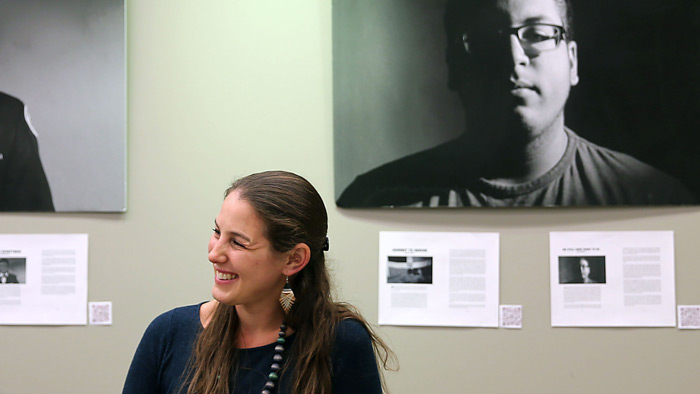
Photo by Jill Anderson, Harvard Graduate School of Education
While a student at Concord Academy, Jessica Lander ’06 fell in love with writing in Sandy Stott’s creative nonfiction class at CA. That experience led her to study writing with John McPhee at Princeton, then to her career as a writer, education journalist, and teacher. Following undergraduate research in a school in Tanzania, teaching at Chiang Mai University in Thailand, and a fellowship spent mentoring Cambodian college women in Phnom Penh, she earned a master’s degree in education policy from the Harvard Graduate School of Education. Passionate about advocating for marginalized people and supporting schools that serve all students well, she has taught at Lowell High School since 2015. A fellow with the California-based Emerson Collective, Lander spent the 2019–20 academic year researching and writing a book on immigrant education in the United States.
LEARN MORE: Hear their stories at weareamericaproject.com.
